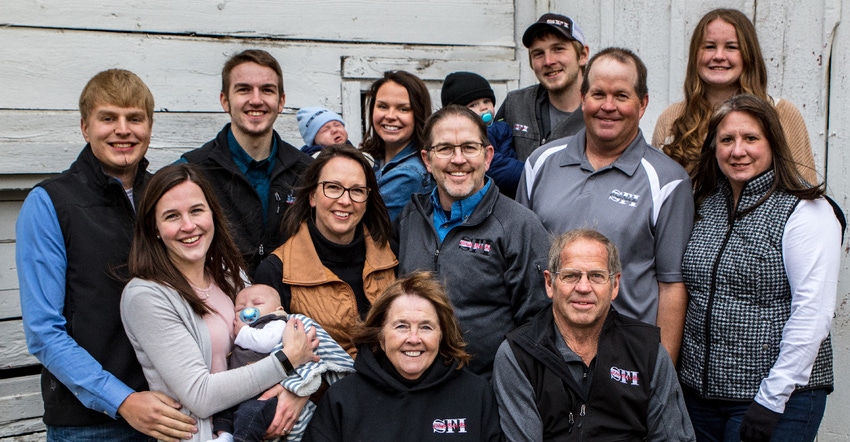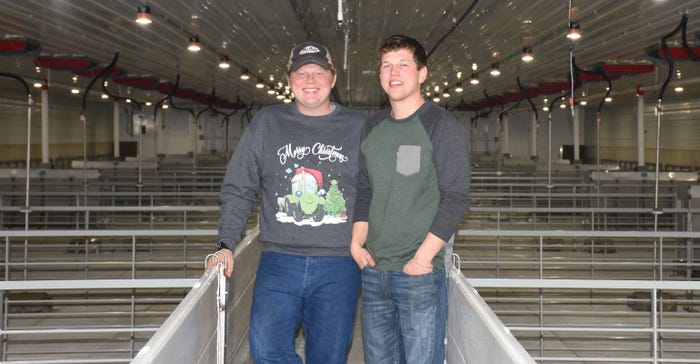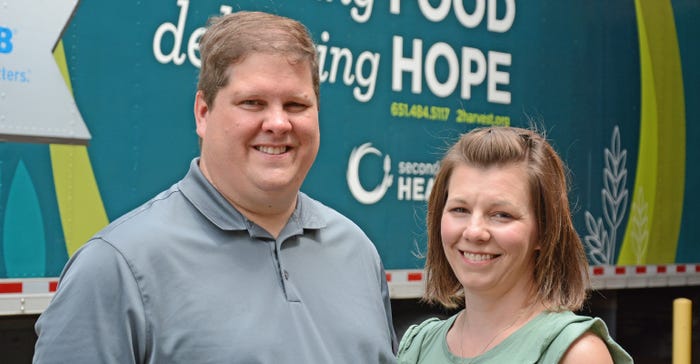February 3, 2021

Individuals and families who have made significant contributions through pork promotion, consumer and producer education, youth mentoring, and service to the pork industry were recently recognized by the Minnesota Pork Board.
Due to the pandemic, the annual awards reception will be held this summer.
This year’s recipients include the Schafer family of Goodhue receiving the Family of the Year award; Stephan and Kristian Melson, Trimont, receiving the Environmental Steward of the Year award; and Mike Patterson, Kenyon, receiving the Pork Promoter of the Year award.
Family of the Year
The Schafer farm of Goodhue began in 1886, featuring traditional agriculture production practices at the time with several enterprises and much less consolidation than most of today’s farms. In 1984, the farm officially became a corporation and began to operate as a multiple-family unit under one core business structure.
Recent generational transfer was fairly seamless, as Lowell Schafer, the fifth generation, anticipated his son Brandon’s return to the farm to take over. Brandon, the sixth generation and current general farm manager, describes the progression as natural, because Lowell was looking to phase out of day-to-day responsibilities.
“Dad had trust in us and was willing and comfortable with us taking over the farm while being a great coach along the way,” Brandon says. “This allowed my generation to pursue our dreams without interrupting the business, and that is largely due to the selfless nature of my parents. They weren’t looking to what they could take with them as they exited, and instead left behind what they could for the generations following them to take over.”
Today, the farm largely focuses on pork production. It also has a cow-calf and seedstock operation.
Brandon and his wife, Monica, manage farm staff, production records and risk management. Two of their children, Max Schafer and Maddie Hokanson, the seventh generation, also work on the farm. Currently, Max manages a sow farm and manure application and works with trucking as needed. After graduating from college in 2019, Maddie returned to the farm and took over as the accountant. She also does freelance work in communications, often creating pieces for the National Pork Board.
Throughout the years, Schafer family members have immersed themselves in the community and in industry organizations, serving on county, state and national industry boards and as industry ambassadors; and holding positions on school and church committees and in numerous volunteer roles.
“Through my involvement in industry activities, I learned the importance of being a part of something greater than myself,” Brandon says. “I formed so many great relationships, many of whom received the Family of the Year award. I always looked to them as mentors and tried to emulate what they have done. I believe their mentorship has led me and my family to this point.”
Max and Maddie acknowledge the opportunity they have as seventh-generation farmers with being able to raise the farm’s eighth generation. The land stewardship, careful management and forward-thinking adaptability will be passed into their hands in time.
“People always ask why I’m so passionate about pig farming,” Maddie says. “The pork industry does a good job at respecting the legacy and nostalgia of farming but is still willing to see what’s next. What the farm was 100 years ago and 50 years ago is so different than what it is today. In order to be relevant, the farm needs to look completely different 50 years from now, and that is up to us.”
Adds Brandon: “The decisions we make today will make the most impact on the people we will never meet. What we do every day, and the impact our business has on our community, neighbors and environment, all are going to have a lasting impact.”
Environmental Steward of the Year
Fifth-generation pig farmers and brothers Stephan and Kristian Melson grew up on a family farm near Trimont. They farmed alongside their father and uncle from a young age and officially immersed themselves in the family business by 2018 by building their own pig barn.
As young farmers, the Melson brothers understand there is much to learn in the world of agriculture. They believe in having open minds to make progress in any area of life.
 EYE ON ENVIRONMENT: The Melson brothers, Kristian (left) and Stephan Melson of Trimont, received the environmental stewardship award from the Minnesota Pork Board.
EYE ON ENVIRONMENT: The Melson brothers, Kristian (left) and Stephan Melson of Trimont, received the environmental stewardship award from the Minnesota Pork Board.

“We know that our farming venture can only be successful if we strive to continuously improve,” Stephan says. “When we built the barn, we wanted to invest in something that would provide returns but also reduce inefficiencies. Having an environmentally sustainable barn shows up on our balance sheet. It’s the right thing to do for our farm and our business.”
Over their anticipated 30- to 40-year tenure of farming, both brothers say they want to be the best environmentally responsible farmers they can be while implementing practices to improve efficiency. One practice they have implemented already is the application of manure rather than commercial fertilizers to nourish their crops.
“We inject the manure into the ground, building soil health and reducing the risk for runoff,” Stephan says. “By injecting manure, there is less nutrient runoff lost to volatilization. Not only is this a benefit to us because our crop yields are higher, but it is also a benefit to the environment. Through injection, our crops use 80% to 100% of the nitrogen within the year versus topical application that can only utilize roughly 35%.”
In today’s social landscape, misinformation about farming practices, such manure or chemical use, threatens consumer confidence in food safety.
“Many people don’t understand how valuable manure is,” Kristian says. “When they drive around and smell a pig barn, they feel differently and become afraid that the manure will be in their drinking water. They don’t understand how thoroughly we manage our manure application.”
Stephan, who also works as an independent crop consultant, understands concerns about resistance — in weeds, insecticides and antibiotics.
“Unfortunately, we see resistance rising in all different areas on the farm,” Stephan says. “It’s getting harder to control weeds, and it’s also getting more expensive, because as chemicals become less effective, higher application rates are necessary to do the job. We need to be proactive to make sure we are doing what’s right from an environmental standpoint.”
He explains that the same situation applies for antibiotic resistance in pigs. Their pigs aren’t treated unless necessary. Each pig is assessed and treated for a limited amount of time to prevent resistance from occurring. All treatments are timed and recorded.
“Stephan and I will do our best to continue our family legacy and make sure we always do what is right for our neighbors, our pigs and the environment,” Kristian concludes.
Pork Promoter of the Year
Born and raised in central Minnesota, Mike Patterson’s agriculture background began in dairy farming. As his parents’ farm evolved, farrow-to-finish pigs were added to the mix in the late 1970s, and the operation has since grown to now include nearly 7,000 sows.
The Pattersons were instrumental leaders in creating the Minnesota Family Farms Sow Cooperative, and Mike immersed himself in the co-op at age 18, being one of the first to become a shareholder. While attending college, he purchased his first barn. Several years later, he expanded with a second barn, along with purchasing more shares in the co-op. He now holds a seat on the board of directors for Minnesota Family Farms.
Mike and his wife, Rebekah, have been active in the pork industry with their four daughters — Maddie, Isabel, Julia and Leia — on their Kenyon farm. Participating in daily chores from a young age and showing pigs at the fair instilled in the girls a passion for agriculture, which led them to start their own company with the help of their parents: Country Girls Showpigs. Their business sells around 200 show pigs annually.
Since high school, Mike has been keen on pork promotion. In high school, he was the county pork ambassador and served as a Minnesota Pork Ambassador runner-up.
 PERSONAL DELIVERY: Longtime pork promoters Mike and Rebekah Patterson, Kenyon, saw their traditional markets take a turn for the worst with the pandemic. Mike worked to find new ways to move pigs and ended up serving as a national spokesman for an industry in marketing turmoil. The Minnesota Pork Board honored him with its Pork Promoter of the Year award.
PERSONAL DELIVERY: Longtime pork promoters Mike and Rebekah Patterson, Kenyon, saw their traditional markets take a turn for the worst with the pandemic. Mike worked to find new ways to move pigs and ended up serving as a national spokesman for an industry in marketing turmoil. The Minnesota Pork Board honored him with its Pork Promoter of the Year award.

Mike never anticipated the scale in which he would be sharing his promotion passion until April 2020. As COVID-19 began impacting the food supply chain, prompting meatpacking plant closures, reporters reached out to Mike. At the time, he had three barns full of pigs ready for market.
“I got on the phone with as many butcher shops as I could,” Mike recalls. “We put together a social media post letting people know we were looking to sell pigs to local people to buy directly.” That post resulted in more than 700 shares, prompting nonstop calls, emails and texts.
By sharing his marketing predicament, Mike was able to sell or donate more than 600 pigs. People stopped by the farm to pick them up and take them to butcher shops. Both he and Rebekah made trips to St. Paul last spring to personally deliver several loads of pigs to the University of Minnesota. A collaboration among the Pattersons, the campus meat lab and the Minnesota Pork Board provided nearly 25,000 pounds of ground pork to Second Harvest Heartland, a metro-based food bank. The only limiting factor to not selling or donating more was the lack of butcher space.
Every pig sold created an opportunity for direct farmer-to-consumer interaction.
“We were able to tell the story of raising pigs and the steps that go into getting that pork chop on their family’s table,” Rebekah says. “This direct interaction provided us with an opportunity to tell the pig farming story that we had never had before.”
Today, the Pattersons’ fridge is scattered with friendly notes of kindness and encouragement sent from people near and far who benefited from the pork they received. They heard countless stories from parents who bought a pig because they had reached their purchased meat limits at grocery stores.
“People take for granted that the meat will be there,” Mike notes. “Consumers have never had to worry about this before.”
Media near and far picked up on the Pattersons’ story. More than 100 articles, radio spots, television segments and podcasts reached hundreds of millions of people. They were highlighted in National Geographic, The New York Times and The Washington Post. An NBC News story reached more than 50 million people. The Farmer also featured them in a story at the time, meeting them on campus during one of their pig deliveries.
Bill Even, CEO of the National Pork Board, compliments Mike for stepping up as a spokesperson during a difficult time.
“Mike was among the first producers during COVID to share reassuring messages on behalf of the pork industry through the national media,” Even says. “Our national consumer response to this issue would not have been nearly as successful without the outstanding contributions of gifted and committed producer spokespeople like Mike.”
Source: The Minnesota Pork Board, which is solely responsible for the information provided and is wholly owned by the source. Informa Business Media and all of its subsidiaries are not responsible for any of the content contained in this information asset.
You May Also Like




